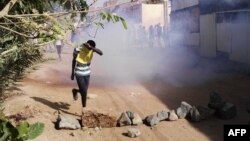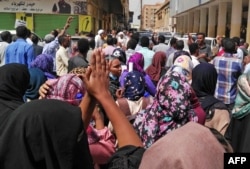More than 1,000 anti-government protesters demonstrated in and around Sudan's capital Khartoum on Thursday, witnesses said, the first rallies since President Omar al-Bashir announced new emergency powers to combat more than two months of unrest.
Security forces fired tear gas at about 400 protesters at Omdurman Grand Market, in Khartoum's twin city across the Nile, witnesses said. The protesters, who are calling for an end to Bashir's 30-year-rule, chanted "Down, that's it."
The protests, initially over high bread prices, have taken place nearly every day since Dec. 19 and have developed into the most sustained challenge that Bashir has faced.
Security forces have responded with tear gas and sometimes live fire. At least 33 people have been killed, according to official statistics, including three security personnel.
Protesters believe the true death toll is significantly higher.
Bashir, who came to power in a 1989 Islamist-backed military coup, declared a nationwide state of emergency last Friday and sacked state governors, replacing them with military and security officials.
This week, he issued a raft of edicts banning unlicensed public gatherings and awarding tough new powers to police. He also established emergency courts.
Security forces can now search any building, restrict movement of people and public transport, arrest individuals suspected of a crime related to the state of emergency, and seize assets or property during investigations.
There was a noticeable increase in the spread of protests across Khartoum on Thursday. Demonstrators were apparently galvanized by a call from the Sudanese Professionals' Association, which has emerged as the main protests organizer, to challenge the emergency measures.
About 250 people protested on Sahafa Zalat Street, one of the capital's main arteries. Police fired tear gas after several demonstrators tried to block off side streets, using stones and burning tires to prevent security forces from chasing them.
The protesters chanted "Revolution is the people's choice" and other slogans and some carried Sudanese flags. Women ululated as some passing cars honked at them in support.
In the east of the capital, police fired tear gas at some 250 protesters on Sitteen Street, an upscale area, witnesses said.
Police also confronted dozens of protesters in Khartoum's poor area of Al-Daim and the Shambat neighborhood of Khartoum North with tear gas, witnesses said. In Shambat, people stood for a moment of silence for the victims of Wednesday's train crash in Cairo that killed at least 22.
Hundreds of protesters also gathered at several other parts of Khartoum and Omdurman.
Bashir has blamed the protests on foreign "agents" and challenged his rivals to seek power through elections.






